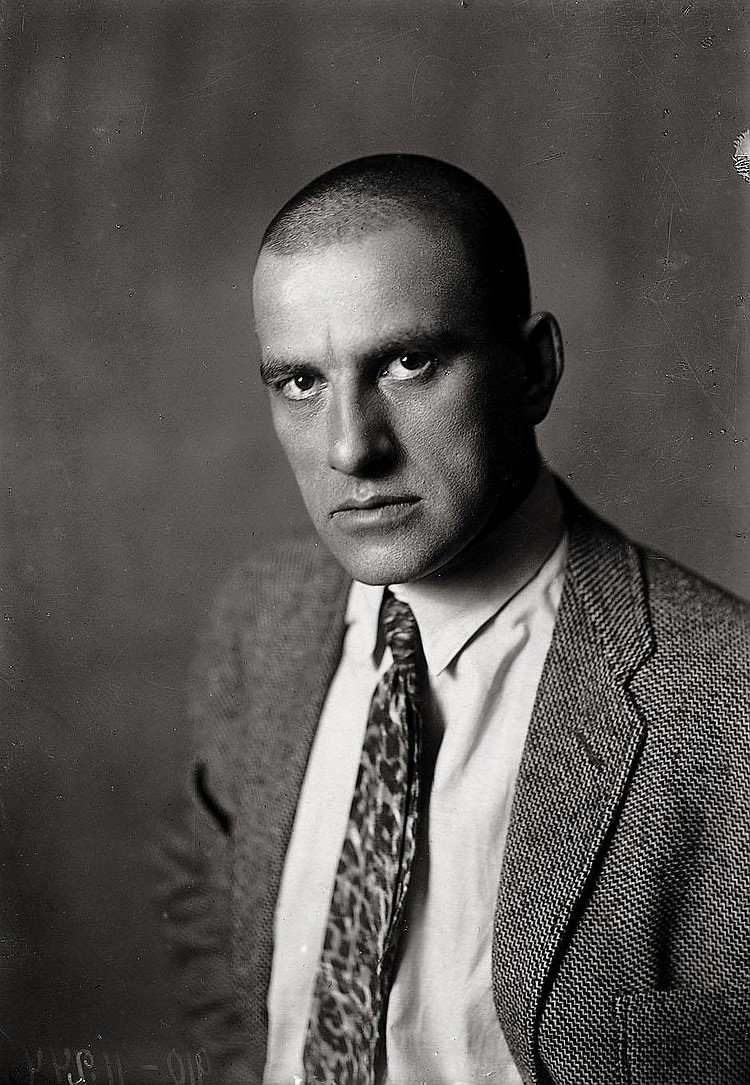Tremendously energetic and productive, Vladimir Mayakovsky entered the history of Russian literature of XX century as a poet-futurist, inventor of new ideas related to poetical content and form.

Why hyperbole, you'd ask. I personally see two reasons of it: the poet's personality (Mayakovsky was somebody who didn't know what "the middle way" is, a man who had "an insatiable thief in his soul", according to Lily Brik, and the circumstances in which the poet found himself: a center of huge changes, the first victory of proletariat in the world, the first government of the people, such a big deal had to be described with the help of "big" words.
I want to show you the power of Mayakovsky's hyperbole and hyperbole-metaphors.
Love, hate, passion, jealousy - everything is exaggerated in his poetry:
Не гроза, / It's not thunderstorm
а это / it's
просто - / just
ревность / jealousy
двигает горами. / is moving mountains.
("A Letter to Tatyana Yakovleva")
His love for the revolution doesn't know boundaries:
(Океан) По шири, / (The ocean) with its breadth,
по делу, / importance,
по крови, / blood,
по духу / its spirit
моей революции старший брат. / is an elder brother of my revolution.
("The Atlantic Ocean")
The scale of his words about the proletariat is enormous:
Для нас / For us
это слово - могучая музыка, / this word is powerful music,
могущая мёртвых сражаться поднять. / that can make the dead wake up and fight.
(from the poem "Vladimir Lenin")
With the help of hyperbole Mayakovky elevates and glorifies human beings:
Растёт человек - главою гор достиг. / The human is growing - already reaching mountains with his head.
(From the poem "War and Peace")
Creating vivid satirical characters, using hyperbole, was one of his favourite things to do:
Профессор,
снимите очки-велосипед. / Professor, take your glasses-bicycle off.
("In a Loud Voice")
Заправляет / Sending
одних только / only
мурманских осетров / Murmansk's sturgeon
по тралеру / on a trawler
ежедневно / daily
в желудок-ров. / to the stomach-moat.
("Curzon")
And finally, I'd want you to look at Mayakovsky talking about himself. When addressing his beloved:
Иди сюда, / come here
иди на перекрёсток / come to the intersection
моих больших / of my big
и неуклюжих рук. / and clumsy hands.
("A Letter to Tatyana Yakovleva")
His poem "A Cloud in Trousers" finishes with a hyperbolic image of himself:
Эй, вы! / Hey you!
Небо! / Heaven!
Снимите шляпу! / Take your hat off!
Я иду! / When you see me near!
("A Cloud in Trousers", translation of Andrey Kneller)
That's who the Russian revolutionary poet Vladimir Mayakovsky was, " He felt it was necessary that he should be read by the people who didn’t read him, that he should be heard by the audiences who stayed away from his readings, and that he should be loved by the woman, who it seemed to him, didn’t love him. There was nothing to be done." (Lily Brik)

The poems are translated from the Russian language by @liverussian, unless stated otherwise.
image source
Inspired by The Poetry Class of Steem Schools on Discord, join us here
